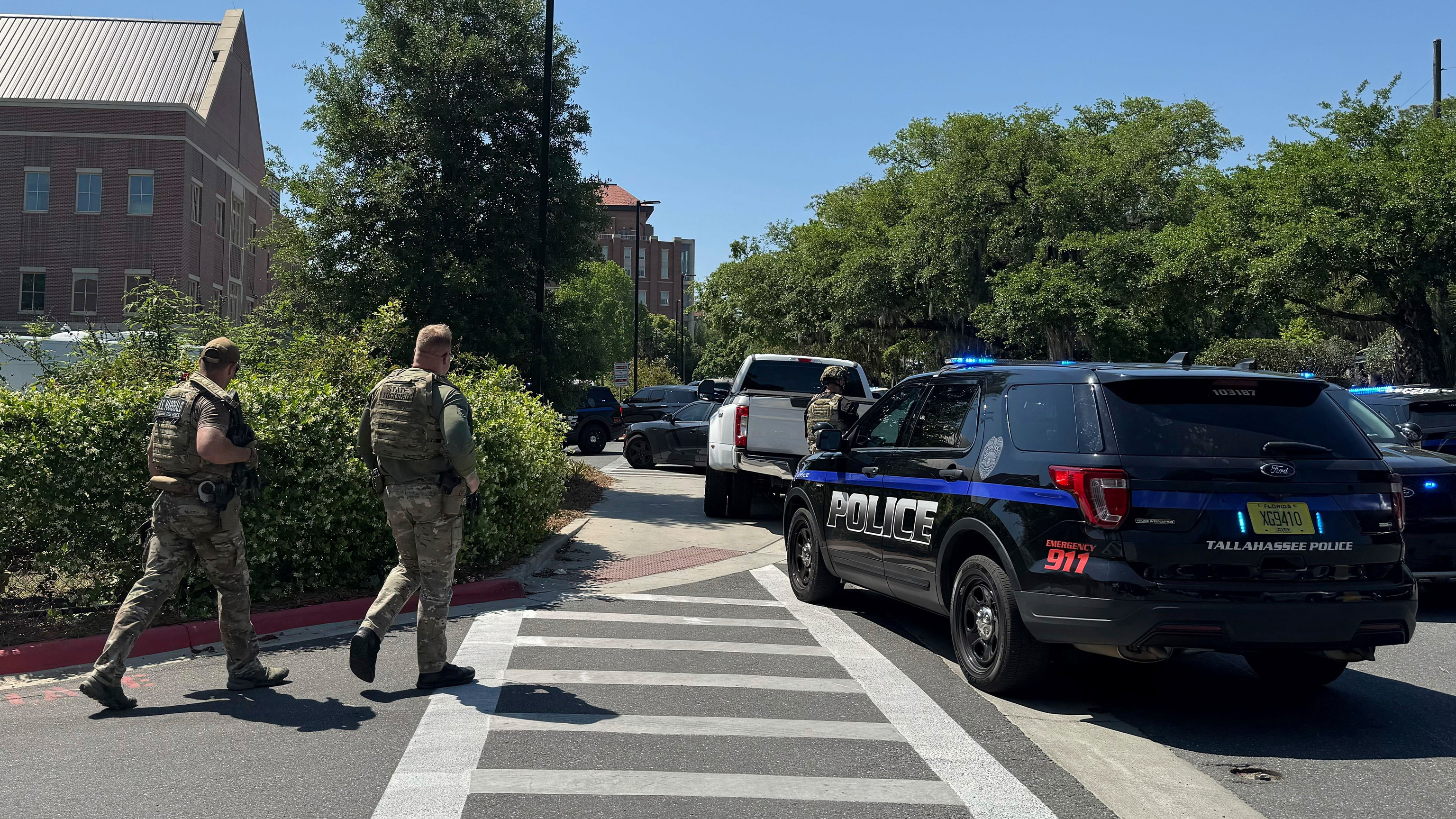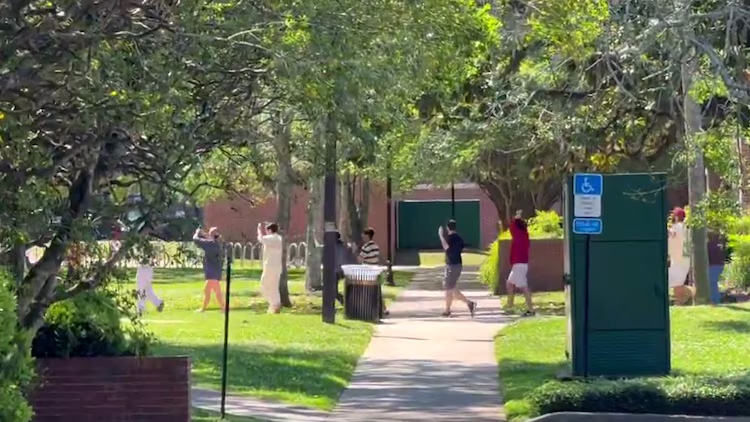'It works:' Pennsylvania teachers, police give advice to NC about new school safety program
HARRISBURG, Pa. (WTVD) -- The State of North Carolina and Commonwealth of Pennsylvania may be known for their shared past as colonies and Civil War battlegrounds, but their collective futures will soon be linked by their common status as pioneers in school safety.
"I think parents in North Carolina should be happy that they're launching this program in the state," Brittany Kline, director of Pennsylvania's anonymous reporting system, Safe2Say Something, tells the ABC11 I-Team. "My mentality on the program has been if we save one life of a student or child, then it's worth it."
The anonymous reporting system, which is being deployed throughout North Carolina's 115 school districts, is the flagship school safety program created by Sandy Hook Promise, the non-profit organization founded and led by the grieving parents who lost children in the massacre at Sandy Hook Elementary School on Dec. 14, 2012.
The program's central theme is empowering students, educators and administrators, to recognize signs and signals of individuals who may be at risk of hurting themselves or others, and anonymously report this information through an app, website, or 24/7 Crisis Center Hotline.
The Keystone State was the first to deploy the system statewide and train students and staff in all of the commonwealth's 500 public school districts. The program's success and positive impact are key motivators in the Tar Heel State's current investment, training and rollout of an identical program across the state.
"I think the trends are showing that as people can own their world, they can own their school and they can own their classroom," Robert "Bo" Trumbo, Director of North Carolina's Center for Safer Schools, told ABC11. "The anonymity is what opens up a whole other channel because now as these recent case studies show, whoever has an opportunity to say something is a hero and not a snitch."
'They're allowed to do whatever they feel is necessary'
Trumbo is a former Secret Service agent whose previous assignments include protecting "Eagle," the popular codename for President of the United States. Today, Trumbo's job is protecting the children of North Carolina, among whom are sure to be the leaders of tomorrow.
"The way those jobs correlate with one another is we depend on a lot of people beyond ourselves," Trumbo told the ABC11 I-Team. "Even in my previous life we had strong partnerships with state and local counterparts in law enforcement, public safety, and emergency management. The same applies here."
Unlike most threats to the U.S. government, however, school violence is generally the consequence of afflicted individuals often falling through the cracks of even the most casual observers. Sadly, a number of America's deadliest school shootings brought with them the recognition of missed warning signs and the inability of peers and adults to connect the dots.
According to Sandy Hook Promise, 80 percent of school shooters told someone of their violent plans, and 59 percent told more than one person.
"If they didn't have a trust factor with a peer or an adult, they may be keeping that information to themselves," Trumbo said of students today. "The goal is to have as much information conveyed to these first responders so they can have more of a laser focus to going to where that problem is."
The Say Something Anonymous Reporting System is the tool by which students will now be encouraged to share relevant information and to do so anonymously. Users can report observed threats, behaviors, actions and harassment, including but not limited to: assault, abuse (physical and verbal), bullying, depression, hopelessness, reckless behavior, social isolation or withdrawal, substance abuse, suicide threats, theft or weapons.
The threats, whether submitted via app, website or telephone, are all collected by a 24/7 crisis center hosted by trained counselors who serve as a kind of triage to determine the credibility, context and urgency of the threat.
The counselors, meanwhile, are able to engage with the tipster in real time through talk, text, email or however the tipster first made contact. Simultaneously, the counselors will then connect with designated staff at the respective school to determine the next plan of action.
"They're allowed to do whatever they feel is necessary," Trumbo said, referring to both students reporting a concern and the counselors and school staff on the other end. "We're concentrating on that back-of-the-house stuff that makes that connectivity line up so that time is not lost."
Inside the Safe2Say Crisis Center
North Carolina's Say Something program won't be fully live until 2020, but lawmakers and state officials point to Pennsylvania for early indications of what to expect.
Pennsylvania's General Assembly voted to mandate Safe2Say's statewide use in 2018 and authorized the Attorney General's Office to establish the 24/7 Crisis Center in Harrisburg.
Safe2Say and the Crisis Center went live on Jan. 14, 2019, and program director Brittany Kline said the impact was immediate: 23,494 tips between Jan. 14 and June 30 - and that excludes any false reports received and test tips to the system.
Now, nearing the one-year anniversary, the Pennsylvania Attorney General's Office said the number of credible tips has surpassed 30,000.
"We get a lot of inquiries from students who call in to check in to make sure we're actually people," Kline said. "They think it's an automated system."
The actual Crisis Center may not look all that different from a standard office floor, but the eight full-time analysts are constantly in communication via phone and computer.
"I know that we have intervened on an act of school violence where officers removed a weapon from the student at school," Kline told ABC11. "Someone submitted the tip through the app, it came to us, and our crisis center contacted the school immediately. The Student Resource Officer took the tip, went to the student and got the weapon from the student."
Though the reports can be received via app, website or hotline, the data shows the mobile app is by far the preferred method for students.
"There is an actual person here who reads everything you post in the system," Kline said. "We have parents here all the time who might overhear something that happens on a video game or see something on Facebook and they don't know what to do with it, but they know their child's safety is at risk."
More than 900,000 students have been trained in the program, plus another 15,000 teachers and staff. In total, there are 3,900 school buildings registered.
Kline noted that it's likely the largest mobilization of Pennsylvania residents in the commonwealth's history - and it's sure to be that for North Carolina's effort, too.
"Students being able to report anonymously actually takes that fear factor out of the equation," Kline said. "They can report without specifically going to somebody, having someone see you go to the office and go to a teacher that removes that anxiety over going forward."
Most tips not related to violence
For North Carolina parents, Kline warned that they will likely be surprised, if not overwhelmed, by the sheer number of tips submitted to the anonymous reporting system -- and how school violence is hardly the only subject.
According to Safe2Say's first annual report, threats against school only accounted for roughly 2.5 percent of all credible tips.
Instead, the top categories for tips included bullying/cyberbullying, cutting/self-harm, suicide/suicide ideation, depression/anxiety and drug use/possession.
"We have had reports of sexual abuse in a home, physical abuse in a home, homelessness, terrible living conditions that we've been able to intervene with students on and get help and resources they need," Kline said. "You can submit screenshots, emails, pretty much anything to us that we can review."
Edward Harry, Chief of the Hazleton Area School District Police, said 60 percent of tips coming his way from the crisis center are related to mental health.
"We got a tip from someone who was texting back and forth with a friend. The friend said he was told, 'I'm sorry, I can't take it anymore. Tell everyone goodbye and it's not your fault, but I've had enough.' Then he said the texts stop coming. This student sent the tip in to Safe2Say, they called me, I got the address, and we went for a welfare check," Harry said. "The student hadn't done anything yet but she was about to. They got her to the hospital and got her evaluated."
Strikingly, Harry's team also received a tip about a threat to school violence -- and his team even recovered an unsecured weapon in the student's home -- but Harry downplayed that incident to ABC11 and maintained that kind of occurrence is by far the exception and not the rule.
"The school-shooting aspect that you hear about is not even a fraction of what's going to come in," Harry said of what North Carolina officials should expect. "We've been able to get a lot of students counseling and get them set up with mental health evaluations and get them set up with the counseling they need so they can deal with whatever problems they've been dealing with."
Echoing Harry's sentiment, Safe2Say's annual review noted that "the numbers in this report show the reality of what our children are facing in school as they struggle with bullying, anxiety and thoughts of self-harm."
NC rollout underway, will go live in 2020
Unlike Pennsylvania, North Carolina will not establish its own crisis center in the state capital. Instead, the state has entered into a contract with Sandy Hook Promise, which will integrate North Carolina's system into its national headquarters in Miami.
The program also comes with a cost -- $5 million in NC's 2018 state budget, which allocates approximately $650,000 a year for the next several years.
According to Trumbo, the NCDPI is actively training three-to-five member point teams at all schools across the state, and one by one, school districts are holding training sessions with their students.
Because of the complexity of getting everyone online, Trumbo said the state is integrating smaller districts first and then moving on to the bigger districts, such as Wake County Public School System, later.
State officials expect NC's Say Something program to be fully online and operational by February.










